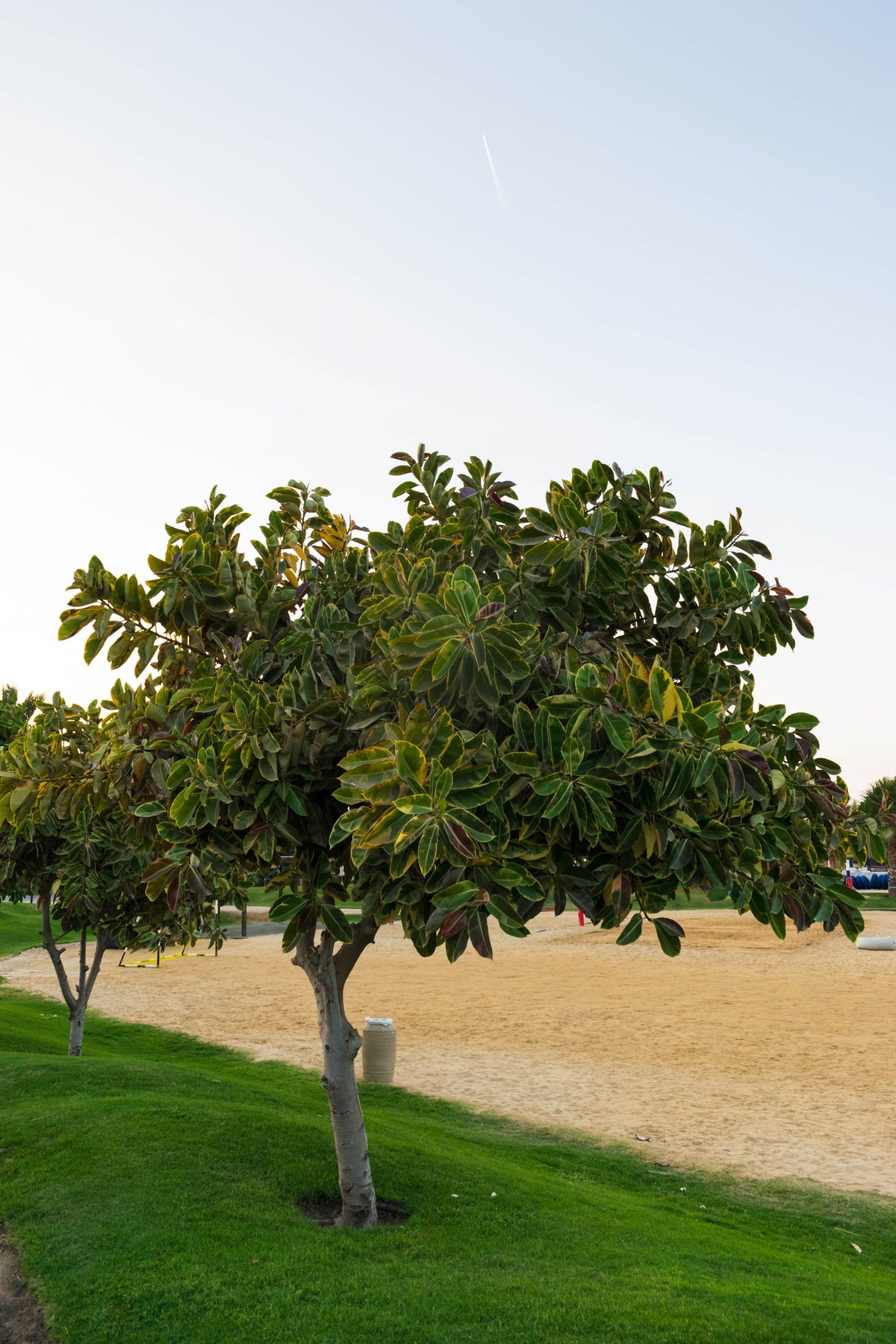Description
Description
The Ficus altissima, commonly known as the Council Tree or Lofty Fig, is a large evergreen tree native to Southeast Asia and the Indian subcontinent. It is admired for its broad, glossy green leaves with yellow or light-green variegation, and its smooth, pale gray bark. Growing up to 15–30 meters tall in natural conditions, this tree is often used as a statement plant in large gardens, parks, and tropical landscapes.
With its striking foliage and adaptable nature, the Council Tree is an excellent choice for shade and ornamental planting in warm climates.
Specifications:
- Height: 15–30 meters (smaller in cultivated settings)
- Width: 10–20 meters (canopy spread)
- Native to: Southeast Asia, Indian subcontinent
- Foliage: Broad, glossy green leaves with light-green or yellow variegation; evergreen
- Growth rate: Moderate to fast
Conditions:
- Soil: Prefers well-drained sandy or loamy soils; tolerates urban and nutrient-poor soils
- Light: Full sun to partial shade
- Water: Moderate; drought-tolerant once established
- Climate: Thrives in tropical, subtropical, and warm temperate regions
Additional Features:
- Roots: Can develop aerial roots in humid conditions; requires space to accommodate its expansive root system
- Fruits: Produces small, round figs that are not typically edible for humans but attract wildlife
- Uses: Ideal for shade, feature planting, and as a statement tree in large spaces
- Spacing: Plant 10–15 meters apart for canopy development
- Low Maintenance: Requires minimal care; prune to shape or manage size
- Pest Resistance: Resilient; monitor for scale insects or ficus whiteflies in stressed plants
- Wildlife Attraction: Provides food and habitat for birds and pollinators
- Ornamental Value: Variegated leaves add visual interest and brighten landscapes
The Council Tree is a majestic and adaptable species, perfect for creating shade and adding a lush, tropical aesthetic to large landscapes while supporting local biodiversity. Its bold foliage and impressive size make it a standout in any setting.
Delivery Information
Delivery Information
We offer flexible delivery options to ensure your tree arrives in perfect condition, whether you're located nearby or on the other side of the world.
- Domestic Deliveries:
We provide reliable delivery services across the country, utilizing our fleet of specialized trucks and train freight networks. Whether you're in a metropolitan area or a remote location, we ensure your trees arrive safely and efficiently. - International Deliveries:
For our global customers, we coordinate delivery via sea freight. With 30+ years of exporting experience, every tree is carefully prepared to meet international biosecurity standards and packaged for safe transport to its destination.
Our team will work closely with you to arrange the most suitable delivery method based on your location, project timeline, and tree size. No matter where you are, we ensure a seamless delivery experience.
Have additional questions? Contact us to discuss your specific delivery requirements!
FAQ's
FAQ's
How are ex-ground trees prepared for delivery?
All ex-ground trees are carefully dug with their rootball intact to preserve the root system and minimize transplant shock. Each tree is stabilized and treated with specialized solutions to promote health during transit. The rootball is wrapped to retain moisture and protect it from damage, and water crystals are added to provide essential nutrients and hydration for the journey. These meticulous preparations ensure your tree remains healthy and ready for planting, whether it’s traveling across the country or overseas.
How long does delivery take?
Delivery times vary depending on your location and the size of your order. Domestic deliveries typically take 1–2 weeks, while international shipping may take several weeks depending on the destination. Contact us for specific timelines.
Are there minimum order quantities for delivery?
For local and nationwide orders, there are no strict minimums, though delivery costs may vary based on order size. For international orders, a minimum quantity is often required to optimize freight efficiency. Contact us to discuss your needs.
Do you provide installation services?
While we focus on the supply and delivery of trees, we can connect you with trusted landscaping partners who specialize in tree installation and site preparation.
Can I visit your farms to select trees?
Yes, we welcome visits to our farms by appointment. Seeing the trees in person allows you to select the perfect specimens for your project. Contact us to schedule a visit.



 Inspection available upon request
Inspection available upon request
 Photos are of example stock
Photos are of example stock
 International Delivery Available
International Delivery Available
 Available For Export
Available For Export
